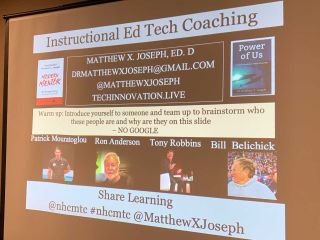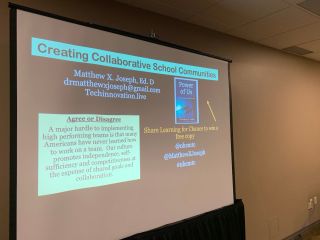I was excited to offer two sessions this year at the Christa McAuliffe Technology Conference. Below are the resources from the event.
Impactful EdTech Coaching

Click here for the slide deck.
Too often, schools launch new technology without a plan for supporting and coaching teachers through the process of using modern technology effectively in their classrooms. One key to launching and supporting the marriage of EdTech and curriculum is increasing the opportunity to support teachers and help them raise student achievement. Today’s students’ needs vary as they are growing up in the digital learning age. Knowing how to integrate existing tech with today’s instructional best practices and strategies engage students to maximize learning. Supporting educators on this journey is a critical step.
Just like with teaching, we need to differentiate instruction/support to meet the needs of the teachers. There is no “one size fits all” approach. The support is also not one time; it is a cycle of support. This cycle generally consists of setting goals, co-planning lessons, observation, and debrief after the lesson. Each step is done collaboratively with the teacher and the integration specialist.
Creating a Collaborative Culture

Click here for the slide deck.
Unlike professionals who work in the private sector, teachers spend most of the day with children in classrooms. Yes, a teachers’ job is to be in front of students. However, as a profession, we should be working tirelessly to find new ways for educators to work together when students are not in front of them. Creating collaborative opportunities will reduce the feeling of working in a silo. In the teaching profession, the word silo usually references a teacher who becomes isolated in their classroom or academic subject and consequently experiences little to no interaction with colleagues. This lack of interaction can stunt professional growth and become a detriment to student learning. Some teachers prefer to work unsupervised and uninterrupted. This singular mindset creates silos and isolation and sometimes breeds an intimidating culture in the school. Teachers benefit and grow from sharing and learning from each other. Think about what we tell our students to do when they have a question: “Ask three before me” or “Work with a partner.” We need to empower and encourage educators to do the same. Teachers and administrators, do you collaborate when you have a question or want support? Isolation can be detrimental to one’s professional development. By interacting with colleagues in our own or other fields, we can gain new insights. We can also share ideas and experiences that will improve our teaching. This book focuses on practical strategies and solutions to increase collaboration and enhance school culture.
cross posted at techinnovation.live
Dr. Matthew X. Joseph is currently the Director of Curriculum, Instruction, and Assessment in Leicester Public Schools. He has been a school and district leader in many capacities in public education over his 25 years in the field. Experiences such as the Director of Digital Learning and Innovation, elementary school principal, classroom teacher, and district professional development specialist. His work and experience focus on supporting teaching and learning. Follow Dr. Joseph on twitter at @MatthewXJoseph or read his blog techinnovation.live
